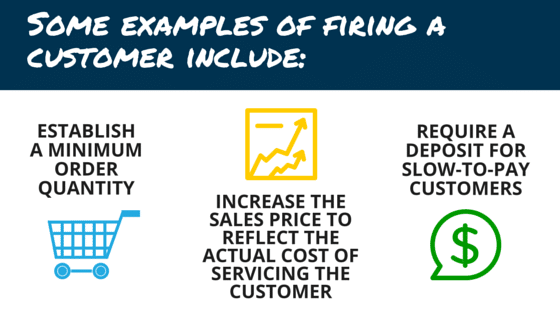Recently, I was having lunch with one of our strategic partners. He was sharing a story with me about a customer they were having problems with. He talked about how difficult the customer was to service. Consequently, that customer consumed more of the firm’s resources than other customers. But he was charging them the same fees. I responded that sometimes, you just have to fire your customers to improve cash flow.
The Cost of Keeping Difficult Customers
Sadly, the situation is not unique to my friend’s firm. Many companies keep difficult customers on board in fear that losing the business will damage profitability and cash flow. What is often overlooked are the hidden costs associated with keeping these customers.
How much productivity is lost servicing the customer who calls on Friday at 4:00 with a rush order?
What are the costs associated with chasing down payment from a habitually late-paying customer?
Sometimes, you create difficult customers from your internal company practices. A few years ago, a client of ours was struggling to understand why, despite increased sales volume, their profitability remained flat. What we discovered is that they were taking a large number of small orders that required as much manpower to process as a larger order would. The resources consumed by processing all these small orders wasn’t reflected in the sales price. As a result, profitability and cash flow didn’t improve as expected with increased sales volume.
Fire Your Customers to Improve Cash Flow
So what’s a business to do? Problem customers hurt profitability. In addition, the drain on cash flow caused by servicing these customers can also seriously hinder the company’s ability to grow. As difficult as it may be, one of the most effective ways to improve profitability and free up cash is to “fire” difficult customers.
It’s true that some customers may leave if you increase their price or require a deposit. But weeding the company garden of these problems will free up resources to service more desirable customers. You will not longer see those that stay despite these measures as problem customers. Instead, you will see them as keys to the company’s success.
Often, the business you don’t take can be as important as the business you do take. When you identify those customers who are draining company resources, either fire them or take steps to turn them into desirable customers. As a result, you can free up company resources tremendously.
(Looking for other ways to increase cash flow and profitability? Download our free list “25 Ways to Improve Cash Flow“).














